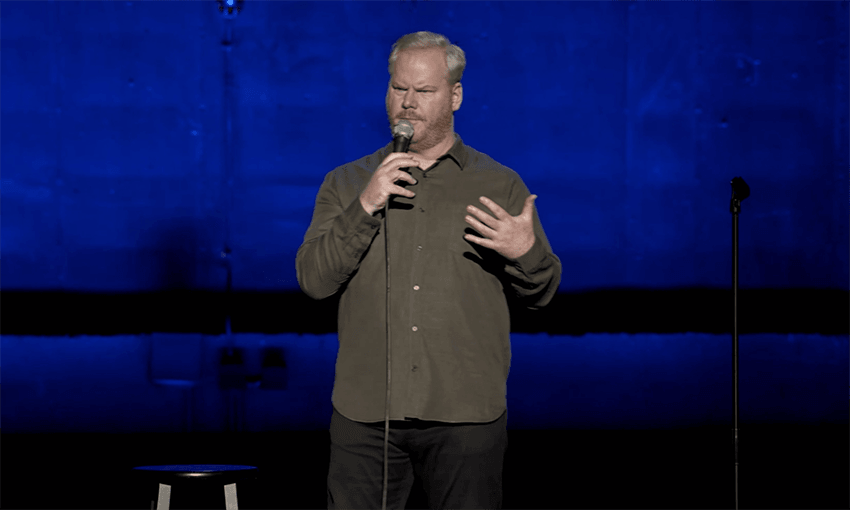The myth that Māori wiped out the Moriori people is the punchline of a new Jim Gaffigan joke.
Update 13/9: Jim Gaffigan has apologised on Twitter, saying he was “simply repeating what he was told”.
On the day that the government announced New Zealand history will become compulsory in schools, one of the most pervasive myths about this country’s past has been given a big international boost, it has emerged.
In his new Amazon Prime special, Quality Time, stand-up comic Jim Gaffigan delivers a bit perpetuating the fiction of the Moriori as a pre-Māori civilisation in Aotearoa.
The sequence, noticed by Twitter user Tanya Fretz, begins with the premise that British colonists once shared New Zealand with the “warrior-like Māori” who arrived after the Moriori.
“The first people in New Zealand were the Moriori [pronounced Māori-ori], and then the Māori came and ate them,” Gaffigan says.
In case you were in any doubt, he adds: “I’m not even making that up.”
Gaffigan continues: “Could you imagine those initial English settlers in New Zealand? Because the British had conquered the world. They had colonies on every continent, so by the time they got to New Zealand they were like ‘we’ve done this before, let’s meet with the locals and take over.’
“So they met with the Māori and they were like, ‘so what happened to these Moriori people? Did you kill them?’ And they were like, ‘yeah, and then we ate them,’ and the English were like, ‘We were thinking we could share the islands’. Do you wanna share them?’
“’You’re not hungry now are you? Get them shepherds pie, tell them it’s made out of shepherds’.”
As researcher Keri Mills explained in an article for The Spinoff, as far as science is concerned, there were no pre-Māori people. While Moriori were killed by Taranaki Māori in 1835, the conflict was between two specific iwi/imi.
“[The myth] provides a convenient defence for Pākehā colonisation of New Zealand – or at least an argumentative strategy to silence Māori grievance about it,” says Mills. “The strategy goes along the lines of: ‘Who are you to complain? You did it yourself.’”
Academic opinion differs on the practice of cannibalism in te ao Māori, however historically it is a trope which has been used to dehumanise indigenous cultures.
In his book The Quest for Origins, the historian Kerry Howe argued the myth of the genocide of the Moriori was a colonial technique to justify the subjugation of Māori. More recently, Don Brash used it as an argument against increased uptake of te reo Māori.
Ten years ago, in his speech Once Were Gardeners, Moana Jackson demonstrated that the characterisation of Māori as a purely warrior race is based on a historic lie. Society and the state have absorbed that myth and utilised the implications to stereotype Māori as brutish, violent and irresponsible, Jackson says.
Gaffigan’s joke is part of a broader riff on colonisation, in which he considers Aboriginal relations in Australia and Columbus’s effects on the Americas. It comes during the year of the 250th anniversary of Cook’s arrival in New Zealand and the beginning of relations between Māori and the Crown.
Some Māori are calling for a boycott of the Tuia 250 celebrations, arguing Māori continue to suffer under the historical and enduring rights violations Cook’s arrival sparked. The celebrations are set to cost upwards of $20m and will run from October until December.
Amazon Prime has been approached for comment.
